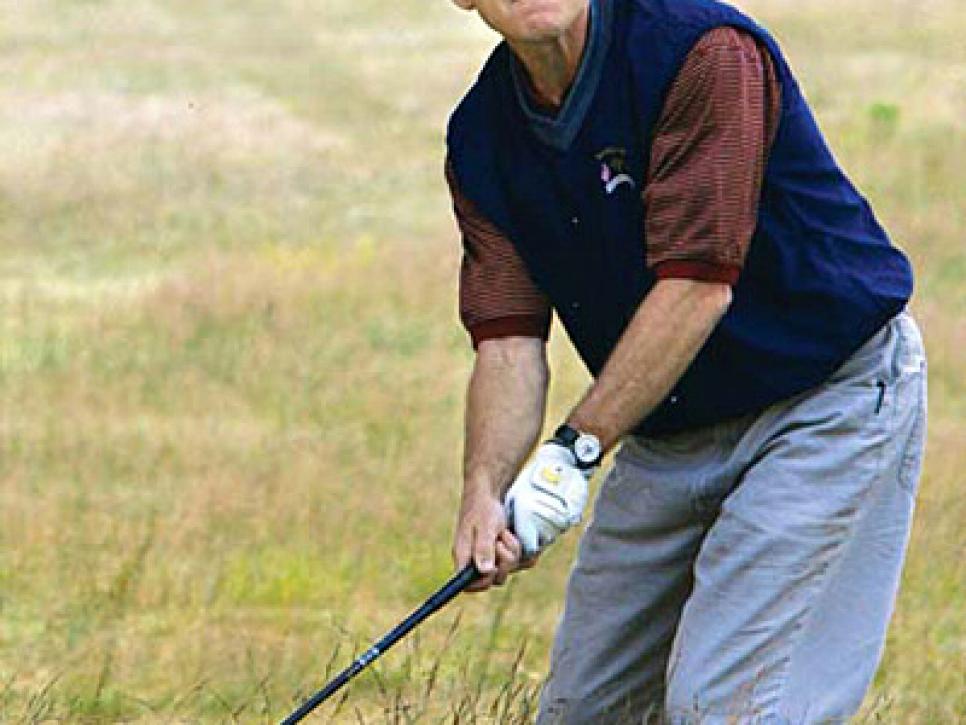News
Golf a Casualty When War of Words Heats Up

I couldn't care less whether a President chops wood or plays Chopin in his free time. If he happens to enjoy golf, hail to the chief for that, multiple mulligans and all (Gerald Ford seems to have been the presidential exception in not utilizing breakfast balls). I want a president to have his eye on the ball and keep his head down when he is in the Oval Office. What he does when he is away from it is his business, although I would prefer that he has something deeper than the latest John Grisham best seller on his nightstand and that his vacations can be counted in days, not weeks.
With President George W. Bush's approval rating plunging downward where it might soon equal the handicap of the average golfer, few are cutting him much slack these days. But he didn't help his cause last week when he explained in an interview with Politico and Yahoo! News why he quit playing golf Aug. 19, 2003, five months after the start of the Iraq War, when a truck bomb at United Nations headquarters in Baghdad killed more than a dozen people, including Sergio Vieira de Mello, the top U.N. official in Iraq.
"I don't want some mom whose son may have recently died to see the commander in chief playing golf," said Bush, who was informed of the attack while playing golf in Texas. "I feel I owe it to the families to be as—to be in solidarity as best as I can with them. And I think playing golf during a war just sends the wrong signal. I was playing golf … They pulled me off the golf course, and I said, 'It's just not worth it anymore to do.' "
But riding a mountain bike is OK? Weed-whacking on his ranch is OK? What is the difference between watching a movie and playing nine holes?
Golf always has been a convenient punching bag for those wishing to use it as a negative symbol of elites—John F. Kennedy was relieved when his tee shot didn't go in at the par-3 15th at Cypress Point GC shortly before he became the Democratic nominee in 1960 because he knew it would have made headlines—but golf isn't the problem. To equate quitting a game with the life-and-death consequences of men and women sent to a war he initiated is the problem.
Brandon Friedman, who served in Iraq and Afghanistan as an infantry officer and is the author of the memoir The War I Always Wanted: The Illusion of Glory and the Reality of War and vice chairman of VoteVets.com, told reporters: "Thousands of Americans have given up a lot more than golf for this war. For President Bush to imply that he somehow stands in solidarity with families of American soldiers by giving up golf is disgraceful. It's an insult to all Americans and a slap in the face to our troops' families. It shows how disconnected he is from everyday Americans, especially those who are serving in Iraq."
Ironically, as typified through the story elsewhere in these pages about Dan Nevins, grievously wounded while on military duty in Iraq, golf is helping lots of injured soldiers adjust to life with their disabilities. The game can enable them to discover what is possible, what remains, after so much has been taken away.
As Don Van Natta Jr. details in First Off The Tee: Presidential Hackers, Duffers, and Cheaters From Taft to Bush, his chronicle of presidents and golf, shortly after assuming the presidency Ford called Dave Stockton, his recent partner in a pro-am, to congratulate him for winning the Sammy Davis Jr. Greater Hartford Open. "Reporters wanted to know: What kind of golfer was President Ford?" Van Natta writes. "It was the first assessment of Ford's play from a pro golfer who knew. Stockton did not dodge the question. 'He's a pretty good golfer,' he said, 'and he could be much better if he could find more time to play.' Stockton thought about that response for a moment, then added: 'But I hope he doesn't. I'd rather he be a good president than a good golfer.' "
Ford tried admirably to be both. Just a couple of days after giving an unconditional pardon to former president Richard M. Nixon, Ford appeared Sept. 11, 1974, at the dedication of the World Golf Hall of Fame in Pinehurst, N.C., keeping a commitment he had made before his sudden promotion. Ford spoke at the dedication ceremonies, played nine holes with several of the hall of famers and attended a gala dinner that evening. "This afternoon, for a few hours, I tried to make a hole-in-one," Ford said. "Tomorrow morning, I'll be back in Washington trying to get out of one."
Whether George W. Bush played golf or not throughout his presidency while his war raged—CBS News says his last round was nearly two months after the round he cited, by the way—doesn't matter. Golf is not the problem.